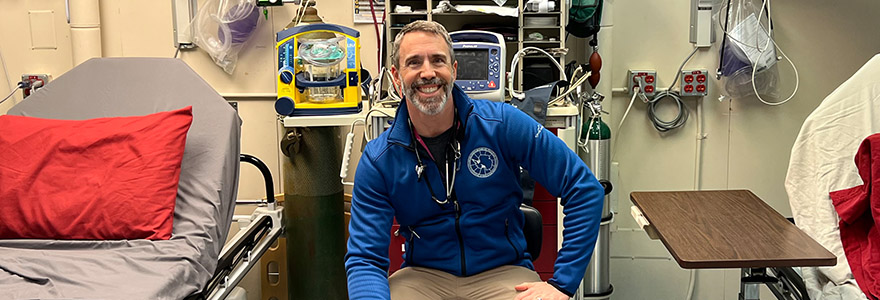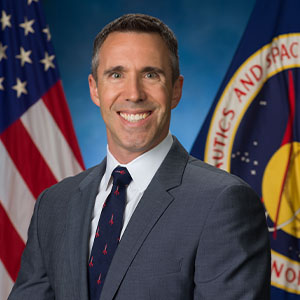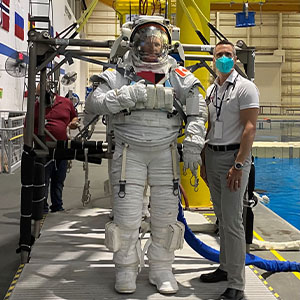Space medicine career launched at Schulich comes full circle with alumni award

By Cam Buchan
Dr. Kris Lehnhardt, MD’03, loves space. He loves everything about space.
However, growing up, the self-declared space traveller also wanted to be a veterinarian. He remembers how his mother sorted out this whole childhood dilemma with a simple question: “Do you think they have a lot of vets in the space program?”
“That’s when I realized my interests were somewhat disconnected,” said Lehnhardt, recipient of this year’s Schulich School of Medicine & Dentistry Alumni Award of Distinction for Young Alumni, and also named the Dean’s Distinguished Lecturer. “So, I always joke that I just switched species.”
Now a physician and the Element Scientist for Exploration Medical Capability in the Human Research Program at the NASA Johnson Space Center, Lehnhardt was among the recipients of the School’s Alumni of Distinction Awards, which will be handed out at a gala event during Homecoming 2023.
“Congratulations to our Alumni of Distinction award winners, who represent the best of our Schulich community. They are the academic trailblazers, community leaders, and role models for all of us. We’re so thrilled they’re a part of our School’s fabric, and grateful for their continuing contributions as Schulich alumni.”
- Dr. John Yoo, Dean of Schulich Medicine & Dentistry.
 Dr. Kris Lehnhardt, MD’03, recipient of Schulich Medicine & Dentistry’s Alumni Award of Distinction for Young Alumni, and the Dean’s Distinguished Lecturer
Dr. Kris Lehnhardt, MD’03, recipient of Schulich Medicine & Dentistry’s Alumni Award of Distinction for Young Alumni, and the Dean’s Distinguished Lecturer
Born in Toronto, and raised in Matawatchan, Ontario, a small community near Ottawa, Lehnhardt was encouraged by a high school guidance councillor to investigate the profiles of Canadian astronauts, where he was inspired by the story of Dave Williams, astronaut and emergency physician.
“So, my path to medicine started with me wanting to be a vet and ended up wanting to become an emergency physician because of Dave Williams.”
While other medical schools may not have accepted Lehnhardt because of his interest in space medicine, interviewers at Schulich Medicine were very interested in the young man with the astronaut dreams. Lehnhardt received a great deal of support during his medical training and residency in emergency medicine for the valuable but unconventional training opportunities in such areas as aviation, diving, and space medicine. After graduating, Lehnhardt practised in London, Ontario, and also became adjunct faculty at what is now the Institute for Earth and Space Exploration.
But space still seemed, quite literally, a long way off.
“There weren’t many opportunities to practise space medicine in Canada,” he said. “So, I decided to just point myself in the direction I wanted to go.”
That direction landed him in a program called the International Space University Space Studies program, whose main campus is in France, and then on to Washington, D.C., where he became faculty at George Washington University.
“It was through that work that I got to meet more people within the space medicine community, and when this NASA job opened up, they encouraged me to apply. Looking back on it, everything I had done previously set me up perfectly to do this NASA job. It seems like this was all planned, but it very much was not.”
Lehnhardt helps to lead a team of doctors, scientists, and engineers in the design of medical systems that are going to take astronauts to the Moon and ultimately to Mars – a transit from the Earth of at least seven months, with a round-trip mission estimated to last approximately 500 days.
“If you look at the way NASA does human space flight right now, we are very much focused on the International Space Station, which is pretty close to Earth. I tell people that I live in Houston, and technically, when the space station is overhead, it’s closer to me than Dallas.”
That means resupply, communications and even medical emergencies can be handled efficiently from the station. But trips to the Moon, and Mars mean no resupply opportunities and delayed or limited communications. “In space, we have to change everything we do in terms of medical care to a more autonomous model. The astronauts and their vehicle must be as Earth-independent as possible.”
 Dr. Kris Lehnhardt provided medical support to Canadian astronaut Josh Kutryk during spacewalk training at the NASA Johnson Space Center Neutral Buoyancy Laboratory
Dr. Kris Lehnhardt provided medical support to Canadian astronaut Josh Kutryk during spacewalk training at the NASA Johnson Space Center Neutral Buoyancy Laboratory
Lehnhardt explained that every system in the human body is affected by space travel, and his team is working on ways to mitigate or prevent these changes. Quite simply, the longer a space mission lasts or the farther away it gets, the greater the medical risks become. Treatment and prevention strategies are needed that are simple and require less resources to learn and use. For example, blood testing or ultrasound capabilities using simple support tools are being developed to guide astronauts through what in space are complex medical procedures.
Lehnhardt said his time at Schulich Medicine contributed a great deal to the way he is tackling the medical challenges of space travel, and winning the alumni award has brought his career full circle.
“It's very special for me that it's coming from Western. When I interviewed at other schools, I was told that space medicine wasn't real. Western was not only supportive of my interests, but encouraged me to pursue them,” he said. “I wouldn't be here if it hadn't been for the support and encouragement of the people at Western.”
But Lehnhardt hasn’t given up on his childhood dream of space travel.
“I am never going to stop trying. I’ve applied a few times to the Canadian Space Agency for its astronaut selection, and I did pretty well in the last round. And frankly, now that we’re reaching the dawn of commercial space flight, at some point, if I can ever save up enough money, I’ll just pay for myself to go up there.”









